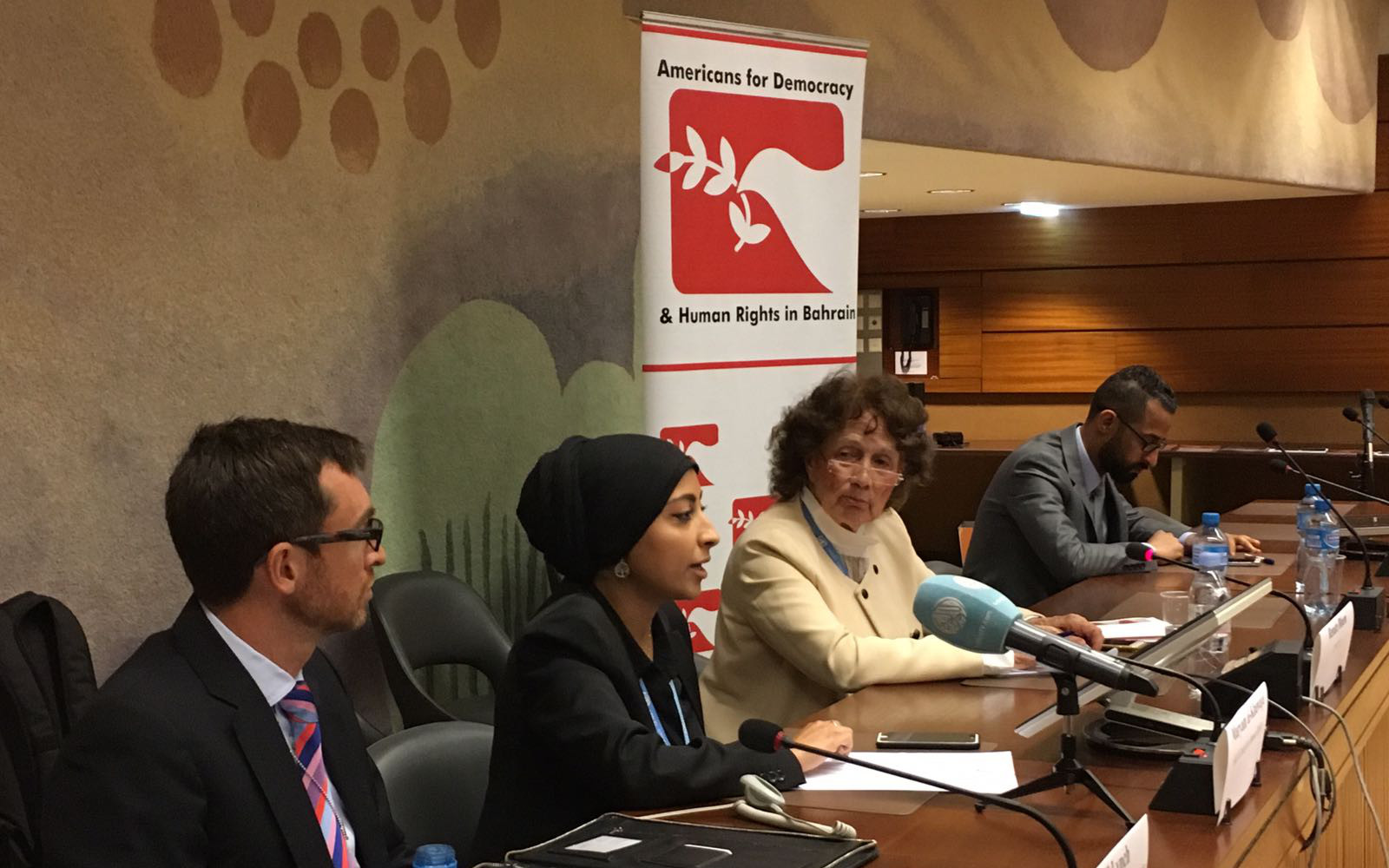 On 7 June 2017, Americans for Democracy & Human Rights in Bahrain (ADHRB) hosted a side event during the 35th Session of the UN Human Rights Council in Geneva. The event, entitled, “Bahrain Reprisals: Targeting Civil Society for Cooperation with the United Nations,” focused on the worsening trend of reprisals against civil society activists for engaging with the United Nations’ bodies and mechanisms. The event was cosponsored by: International Service for Human Rights (ISHR), CIVICUS World Alliance for Citizen Participation, the Gulf Center for Human Rights, the Bahrain Institute for Rights and Democracy, Index on Censorship, Cairo Institute for Human Rights Studies, and the European Center for Democracy and Human Rights.
On 7 June 2017, Americans for Democracy & Human Rights in Bahrain (ADHRB) hosted a side event during the 35th Session of the UN Human Rights Council in Geneva. The event, entitled, “Bahrain Reprisals: Targeting Civil Society for Cooperation with the United Nations,” focused on the worsening trend of reprisals against civil society activists for engaging with the United Nations’ bodies and mechanisms. The event was cosponsored by: International Service for Human Rights (ISHR), CIVICUS World Alliance for Citizen Participation, the Gulf Center for Human Rights, the Bahrain Institute for Rights and Democracy, Index on Censorship, Cairo Institute for Human Rights Studies, and the European Center for Democracy and Human Rights.
Michael Payne, international advocacy officer for ADHRB, opened the panel and began the event by giving a brief introduction of significant recent events in Bahrain. He noted the government’s re-empowerment of the National Security Agency in January 2017, the clampdown on civil society and political society organizations, including al-Wefaq, Wa’ad, and al-Wahdawi, the arbitrary denaturalization of Sheikh Isa Qassim, and the violent government raid of the peaceful protesters in Duraz outside Sheikh Qassim’s house. Within this context, he introduced the issue of reprisals against civil and political society and human rights activists for their work. He particularly highlighted the reprisals faced by activists who cooperate with United Nations (UN) human rights mechanisms, like the Human Rights Council. He further highlighted ADHRB’s newest publications on the closure of civil society space and Bahraini violations of the tripartite labor agreements.
Renate Bloem, CIVICUS Alliance’s UN Representative,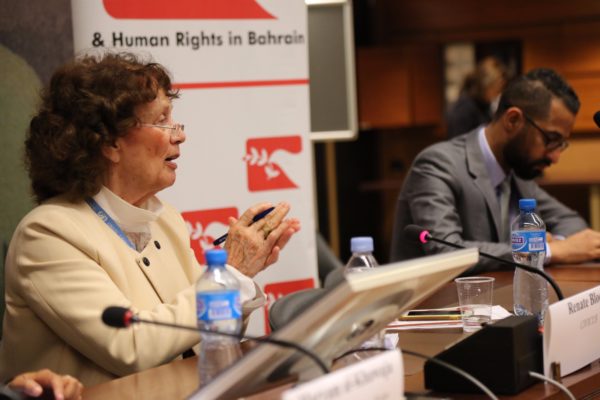 moderated the event and opened with brief remarks addressing the climate in which the panel is taking place. She noted that the last time she was at the UN Human Rights Council, it was during Bahrain’s 2nd Universal Periodic Review, in 2012. She stated that during that time, the human rights situation in Bahrain was better than it is today, describing the current situation in Bahrain as dark. However, she tempered her observation, saying that many of the repressive issues present during the suppression of the protests in 2011 are still in place and the people of Bahrain are facing many of the same problems as they did in 2011.
moderated the event and opened with brief remarks addressing the climate in which the panel is taking place. She noted that the last time she was at the UN Human Rights Council, it was during Bahrain’s 2nd Universal Periodic Review, in 2012. She stated that during that time, the human rights situation in Bahrain was better than it is today, describing the current situation in Bahrain as dark. However, she tempered her observation, saying that many of the repressive issues present during the suppression of the protests in 2011 are still in place and the people of Bahrain are facing many of the same problems as they did in 2011.
Yusuf al-Hoori, an exiled Bahraini activist, began the panel with his remarks about reprisals against civil society activists and human rights defenders because of their work. He discussed how reprisals against human rights defenders and activists has grown over the years. Whereas previously, he noted, the Bahraini government targeted activists themselves, authorities have started targeting the family members of activists. They physically and sexually harass and detain the brothers and sisters and mothers and fathers of human rights defenders in an effort to force activists to stop their work. Because of the nature of Bahraini society, this kind of abuse and these kinds of violation are treated as shameful and the victims are often reluctant to discuss their experiences and harassment in detention. As an example of targeting family members of activists, al-Hoori pointed to the experience of Sayed Ahmed Alwadaei who is the director of advocacy at the Bahrain Institute for Rights and Democracy. While Alwadaei was participating in the 34th session of the Human Rights Council in Geneva, Bahraini officials arrested his mother-in-law, brother-in-law, and his cousin for criticizing the United Kingdom, a major ally of Bahrain, and abused them in detention in an effort to force Alwadaei to halt his human rights work.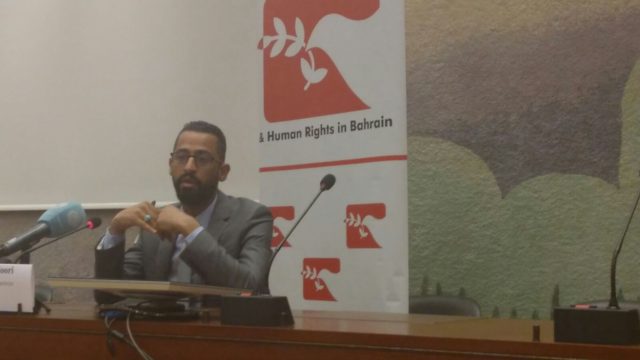
Al-Hoori also discussed how Bahraini officials use the language of terrorism to delegitimize activists and members of the political opposition. By casting peaceful critics of the government as terrorists, Bahraini authorities are able to bring criminal proceedings against them. Under this systematic persecution, the government has forced many activists to leave the country, whether it pressured them into fleeing, or whether it revoked their citizenship and then deported them. Al-Hoori notes that even as authorities use the language of terrorism to label peaceful activists as criminals, government-run and government-supported news sites fabricate rumors about activists in an attempt to delegitimize their work. For instance, al-Hoori cites government attempts to make Husain Abdulla, the Executive Director of ADHRB, lose his credibility. He also pointed to government-sponsored attempts by the Saudi and Emirati governments to make activists participating in international human rights forums look bad. He stated that the Saudi and Emirati governments, for example, pay people to go to events and ask pointedly critical questions designed to delegitimize the event and the participants.
After al-Hoori’s remarks, Bloem noted how the change from Bahraini 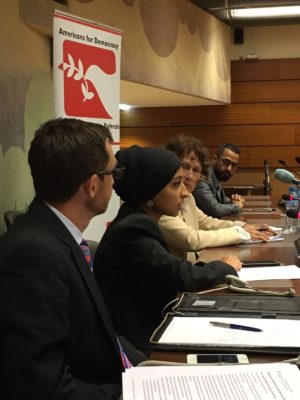 authorities targeting activists to targeting activists’ families for their advocacy abroad has given reprisal new and startling dimensions, stating “This is not acceptable.” She acknowledged the difficulties inherent in international advocacy, particularly with the Human Rights Council, but also observed the importance of appealing to the UN, stating, “Even though Human Rights Council does not have the greatest reputation, activists still come to it because they want their voices to be heard.” She continued, stating that they come to the Human Rights Council because, with the closure of civil society and free expression space in Bahrain, the Council, despite its shortfalls is one of the only places they can make their case.
authorities targeting activists to targeting activists’ families for their advocacy abroad has given reprisal new and startling dimensions, stating “This is not acceptable.” She acknowledged the difficulties inherent in international advocacy, particularly with the Human Rights Council, but also observed the importance of appealing to the UN, stating, “Even though Human Rights Council does not have the greatest reputation, activists still come to it because they want their voices to be heard.” She continued, stating that they come to the Human Rights Council because, with the closure of civil society and free expression space in Bahrain, the Council, despite its shortfalls is one of the only places they can make their case.
Sayed Ahmed Alwadaei, the director of advocacy from the London-based Bahrain Institute for Human Rights called into the panel via Skype from London, and discussed the perils facing human rights defenders in Bahrain. He quoted a section of the report from the Bahrain Independent Commission of Inquiry (BICI), about a midnight raid conducted against a human rights defender in his home and described the security forces’ arbitrary detention and torture of the human rights defender, whose name was revealed to be Abdulhadi al-Khawaja, a founder of the Bahrain Center for Human Rights. Alwadaei told how the BICI details a midnight raid on al-Khawaja’s house that resulted in him receiving a broken jaw. After al-Khawaja was taken to a hospital and handcuffed to a bed, he was taken to a detention facility where he suffered torture, lost 12 kilograms of weight, and suffered other health problems. Alwadaei concluded his quote from the BICI by stating that the conditions al-Khawaja faces in detention are those many human rights defenders and activists suffer from for speaking out against the Bahraini government.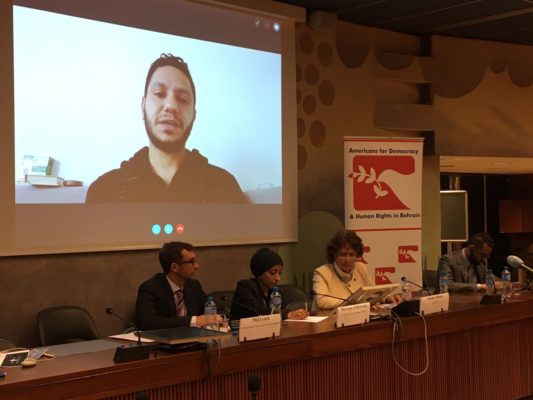
He continued his remarks by noting the deterioration in the situation in Bahrain from 2011 until 2017. While “in 2011, we faced terrible conditions, in 2017, the situation is even worse.” When Bahraini security forces raided the peaceful demonstration in Duraz on 23 May 2017, the security forces killed five individuals, making it the most bloody day in Bahrain’s history since the 1990s. Yet, when activists like Ebtisam al-Saegh spoke out against the raid, they were arrested, detained, and tortured. Al-Saegh was detained, blindfolded, sexually assaulted in detention, and tortured. When she was released from detention, she needed to be hospitalized for a mental breakdown she suffered as a result of the abuse and torture. By engaging in these acts, Alwadaei stated, the Bahraini authorities are sending a message that if someone criticizes the government that officials can break them. Alwadaei concluded his remarks by stating that “carrying out a human rights defender’s work means putting your family members at risk. These are the problems we face in Bahrain, but we cannot give up. The time is now to pressure the government to stop.”
Maryam al-Khawaja began her comments by discussing how the regional human rights cli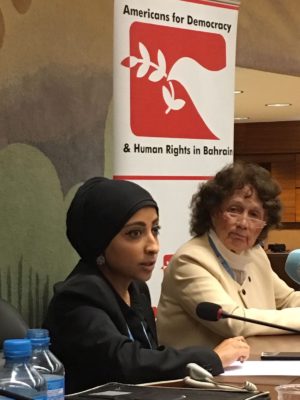 mate has affected the situation in Bahrain and influenced it to make it worse. She stated unequivocally that, with the government’s violent actions in Duraz, the repression is “the worse we’ve ever seen.” In 2011, police attacked the Pearl Roundabout while the massed demonstrators slept, killing four. However, in the violent raid in Duraz, security forces killed five individuals and arrested over 280 other individuals. She noted that “this is worse than what we saw in 2011 at the height of the crackdown.”
mate has affected the situation in Bahrain and influenced it to make it worse. She stated unequivocally that, with the government’s violent actions in Duraz, the repression is “the worse we’ve ever seen.” In 2011, police attacked the Pearl Roundabout while the massed demonstrators slept, killing four. However, in the violent raid in Duraz, security forces killed five individuals and arrested over 280 other individuals. She noted that “this is worse than what we saw in 2011 at the height of the crackdown.”
She shifted her comments to discussing the role of the Human Rights Council, stating that she had been coming to the Council for 7 years. Throughout those seven years, she had consistently called for more action from states on the situation in Bahrain. A fundamental part of her remarks involved accountability, observing that if the international community does not hold the Bahraini government accountable for its abuses and violations, then the situation will get worse. The Council has failed to do this and this failure to hold Bahrain accountable has helped increase the severity of the reprisals against activists for their human rights work.
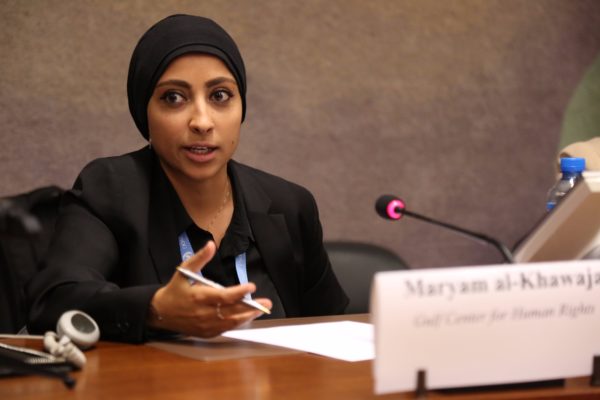 One element of this deepening repression, al-Khawaja observed is the sharing of worst practices among the states of the Middle East and North Africa. This means that when one country takes an action against civil society members or human rights defenders and the international community does not condemn that move, that the rest of the states in the region will take the same action. We saw this, al-Khawaja notes, in the approach Egypt took to suppressing the peaceful protesters in the years since 2011. When the international community failed to take action or even strongly condemn the Egyptian government’s violence, then the United Arab Emirates and Saudi governments echoed the Egyptian government’s response. These states can take these repressive measures because there is no prospect of condemnation from the international community.
One element of this deepening repression, al-Khawaja observed is the sharing of worst practices among the states of the Middle East and North Africa. This means that when one country takes an action against civil society members or human rights defenders and the international community does not condemn that move, that the rest of the states in the region will take the same action. We saw this, al-Khawaja notes, in the approach Egypt took to suppressing the peaceful protesters in the years since 2011. When the international community failed to take action or even strongly condemn the Egyptian government’s violence, then the United Arab Emirates and Saudi governments echoed the Egyptian government’s response. These states can take these repressive measures because there is no prospect of condemnation from the international community.
Noting the international community’s silence, al-Khawaja asked that “If states refuse to condemn the oppression in Bahrain then who can civil society turn toward when faced with issues of reprisals?” In 2012, she states, the Human Rights Council had a better response. The President of the Council took action and named the individuals who were targeted and this tactic had the effect of lessening the repression against these, and other, individuals. But, she states, when Donald Trump visits Saudi Arabia and meets with the King of Bahrain and pledges that the relationship will no longer be strained, then we are facing an uphill battle. She observed that “we have long said that we are looking at shrinking civil society space in Bahrain. This is not true. We are looking at a space that is no longer there.” Ultimately, in order to combat this, we need stronger mechanisms at the Human Rights Council that can respond in a robust manner to issues of reprisals.
Phil Lynch, Director at the International Service for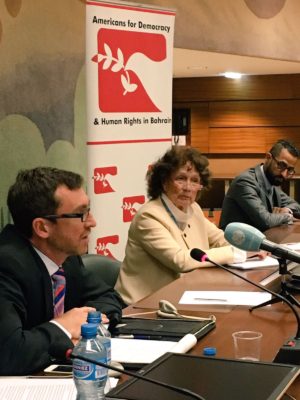 Human Rights, opened his remarks by noting the worsening of trends like travel bans and torture against activists and the expansion of reprisals to encompass the friends, family members, and associates of activists. This phenomenon, he observed is bigger than Bahrain. It is also seen in Egypt and Saudi Arabia. It is ultimately born out of the low cost of committing reprisals. As NGOs and members of the international community, we need, he stated, to change the calculus of states who see and ignore the low cost of committing reprisals.
Human Rights, opened his remarks by noting the worsening of trends like travel bans and torture against activists and the expansion of reprisals to encompass the friends, family members, and associates of activists. This phenomenon, he observed is bigger than Bahrain. It is also seen in Egypt and Saudi Arabia. It is ultimately born out of the low cost of committing reprisals. As NGOs and members of the international community, we need, he stated, to change the calculus of states who see and ignore the low cost of committing reprisals.
One way we can work on this, he states, is through the systematic and universal application of human rights law, which obligates actors like states to investigate, prosecute, and remedy acts of reprisals. The purpose of this obligation is to safe guard access for NGOs and activists. This obligation applies not only to states, but also to international organizations, like the Human Rights Council. While any action must include international organizations, we need states to take a strong public stance, as well. Lynch called on states to publicly pledge not to commit reprisals and to take active steps to stop, and act against, reprisals. In tandem with this public pledge must the elimination of space on the Human Rights Council for states like Saudi Arabia and Egypt, as well as Bahrain—who is not a member of the Council.
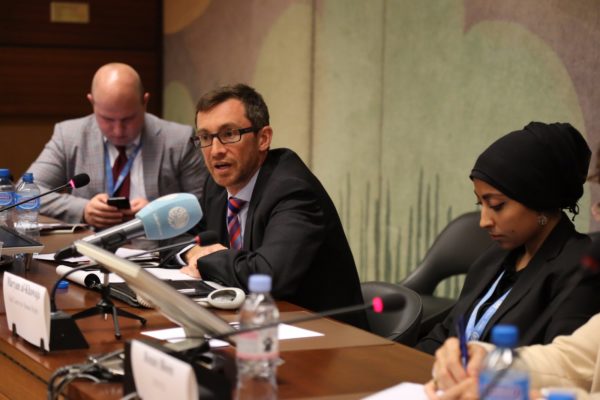 But in addition to states, Lynch notes, is the role of international organizations. We need international organizations to promote public accountability. While this had happened in the past, this practice of promoting public accountability has deteriorated. Part of this is because a lot of states now say that quiet diplomacy is more effective than public diplomacy and public diplomacy shouldn’t be relied on too extensively. However, Lynch says, where reprisals are so widespread as in Bahrain, public diplomacy has an important role to play in deterring and denouncing violations and validating the stories and experiences of victims of reprisals. This kind of public advocacy can take place publicly at the Human Rights Council through the underutilized agenda Item 5. Item 5 addresses cooperation with the Human Rights Council and its mechanisms and states almost never use this agenda item to address reprisals. This practice must change, and states must commit to not only condemning reprisals generally but using the mechanisms of the Council to publicly address the issue and ask the President of the Council what he is doing to fix this problem and what states are doing to remedy this problem as well as to unequivocally condemn acts of reprisals.
But in addition to states, Lynch notes, is the role of international organizations. We need international organizations to promote public accountability. While this had happened in the past, this practice of promoting public accountability has deteriorated. Part of this is because a lot of states now say that quiet diplomacy is more effective than public diplomacy and public diplomacy shouldn’t be relied on too extensively. However, Lynch says, where reprisals are so widespread as in Bahrain, public diplomacy has an important role to play in deterring and denouncing violations and validating the stories and experiences of victims of reprisals. This kind of public advocacy can take place publicly at the Human Rights Council through the underutilized agenda Item 5. Item 5 addresses cooperation with the Human Rights Council and its mechanisms and states almost never use this agenda item to address reprisals. This practice must change, and states must commit to not only condemning reprisals generally but using the mechanisms of the Council to publicly address the issue and ask the President of the Council what he is doing to fix this problem and what states are doing to remedy this problem as well as to unequivocally condemn acts of reprisals.


